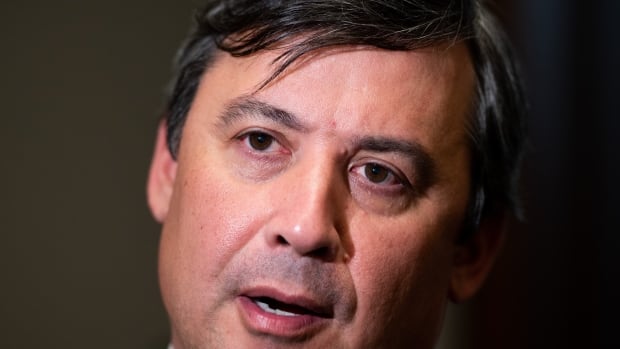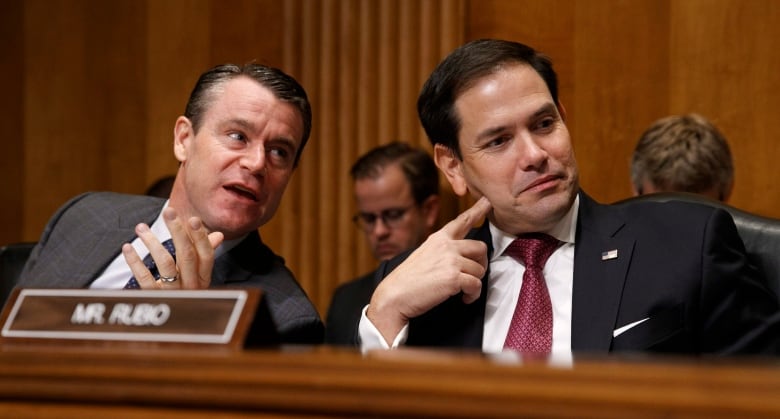
MP Michael Chong is about to appear in a unique locale for an Opposition politician: a hearing in the United States Congress.
American lawmakers studying foreign interference by China have taken an interest in Chong’s case and invited him to testify. He has agreed to appear before the Congressional-Executive Commission on China on Sept. 12.
Members of the committee reached out to the Ontario Conservative after reading media reports about his family being targeted by Beijing.
“It’s not an everyday occurrence,” Chong said of his upcoming testimony.
“The message I want to bring is that transnational repression by authoritarian states like [China] is taking place in Canada, as it is in other democracies; that it’s not just affecting individuals like me, but hundreds, if not thousands of Canadians across the country who suffer in silence, whose cases are not front-page news,” he told CBC News.
“[I’ll testify] that we have to work more closely together as like-minded democracies,” against this, he said.
Chong says he has received threats related to his criticism of the authoritarian government in Beijing, in particular of its abuses against minority Uyghurs.
In addition, Chinese efforts to gather information on Chong’s overseas relatives have resulted in an RCMP investigation and Canada’s expulsion of a Chinese diplomat.
These are the sorts of issues being examined by the U.S. congressional commission, which is pushing for new policies to combat cross-border coercion by Chinese officials.
“In addition to egregious human rights abuses within China’s borders, Chinese authorities increasingly reached into other countries to silence critics and enhance control,” the commission wrote in its latest annual report.
Chong’s case caught the committee’s attention this past spring.
At the time, Chong expressed frustration that he was never told about a 2021 intelligence assessment that flagged risks to his family in China.

That news was first reported by the Globe and Mail in May. The next day, the details were shared with Chong by the head of the Canadian Security Intelligence Service (CSIS).
American political interest was piqued by U.S. media coverage, which reported on Chinese government efforts against certain Canadian politicians, including Chong and former Conservative MP Kenny Chiu.
This comes amid a burst of attention on China-related issues in Washington. Multiple committees are holding hearings on potential economic, security and human rights threats emanating from Beijing.
There’s a special committee in the House of Representatives dedicated to China issues and a flood of bills aimed at countering the alleged threats.
But the specific committee that will host Chong has older origins. It was created in 2000 as part of a historic bill that normalized U.S. trade ties with China, which some American politicians now want to reverse. The committee monitors human rights developments and produces annual reports.
Its composition is drawn from different quarters of Washington — with some members from the Senate, some from the House of Representatives and some appointed by the president.
Its latest annual report includes a section on transnational repression. It chronicled harassment online and in person against Beijing’s critics, threats to their relatives and efforts to coerce Chinese citizens to move back to China, which are now the subject of multiple criminal cases in the U.S.
China “continued a multi-year campaign of transnational repression against critics, Uyghurs, and others to stifle criticism and enhance control over emigrant and diaspora communities,” said the 364-page report.
“Some observers and victims reported lasting emotional trauma or a chilling effect in the form of self-censorship.”
Chong told CBC News he intends to attend the hearing in person. He also intends to talk to officials at the Canadian Embassy in Washington in advance of his appearance.
Other witnesses expected on Sept. 12 include Uyghur activist Rushan Abbas, whose own sister has been interned in the Xinjiang region; and Laura Harth, whose group has chronicled extraterritorial Chinese police stations, including in Canada.
There’s legislative context at play.
Several members of both U.S. parties are pushing for a law that would target transnational repression with new penalties and reporting requirements.
Unlike Canada, the U.S. already has a registry of foreign agents. People in the U.S. could go to jail for failing to declare work for a foreign government. That registry was used to arrest suspects accused of running a so-called Chinese police station in Manhattan.
Ottawa says it’s considering creating such a registry.
Chong says democracies can all learn from each other. He says Canada, for its part, needs its own foreign-agent registry, needs to more aggressively target products made by forced labour and to arrest people who coerce Chinese expatriates to return to China.